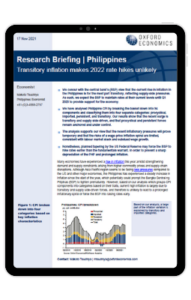Philippines | Transitory inflation makes 2022 rate hikes unlikely

We concur with the central bank’s (BSP) view that the current rise in inflation in the Philippines is for the most part transitory, reflecting supply-side pressures. As such, we expect the BSP to maintain rates at their current levels until Q1 2023 to provide support for the economy.
What you will learn from this report:
- We have analysed Philippine CPI by breaking the basket down into 94 components and classifying them into four separate categories: procyclical, imported, persistent, and transitory. Our results show that the recent surge is transitory and supply side-driven, and that procyclical and persistent forces remain anchored and under control.
- The analysis supports our view that the recent inflationary pressures will prove temporary and that the risks of a wage-price inflation spiral are limited, consistent with labour market slack and subdued wage growth.
- Nonetheless, planned tapering by the US Federal Reserve may force the BSP to hike rates earlier than the fundamentals warrant, in order to prevent a sharp depreciation of the PHP and prolonged inflation.
Tags:
Related Services

Post
Food prices to bottom out in 2024, risks skewed to upside
Our baseline forecast is for world food commodity prices to register an annual decline this year, in aggregate, reducing pressure on food retail prices further downstream. However, we believe the risks to this forecast are overwhelmingly skewed to the upside.
Find Out More
Post
Battery raw material prices to recover
Battery raw materials prices bottomed out last quarter and we think a sustained recovery is looming. Midstream EV battery manufacturing activity has picked up again and inventories have returned to historical levels, suggesting upstream demand for raw materials will also bounce back.
Find Out More